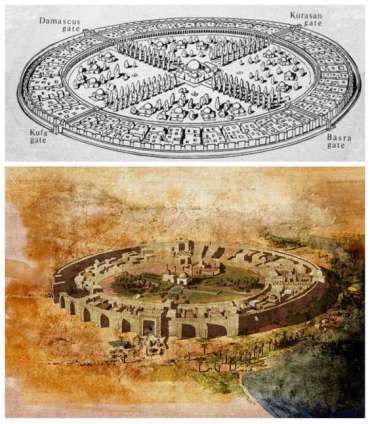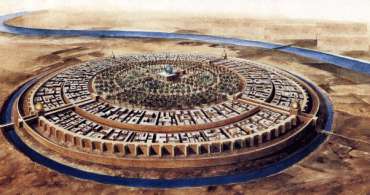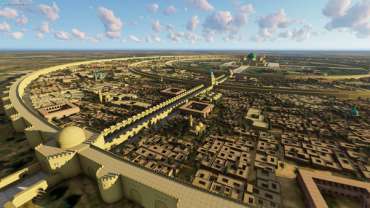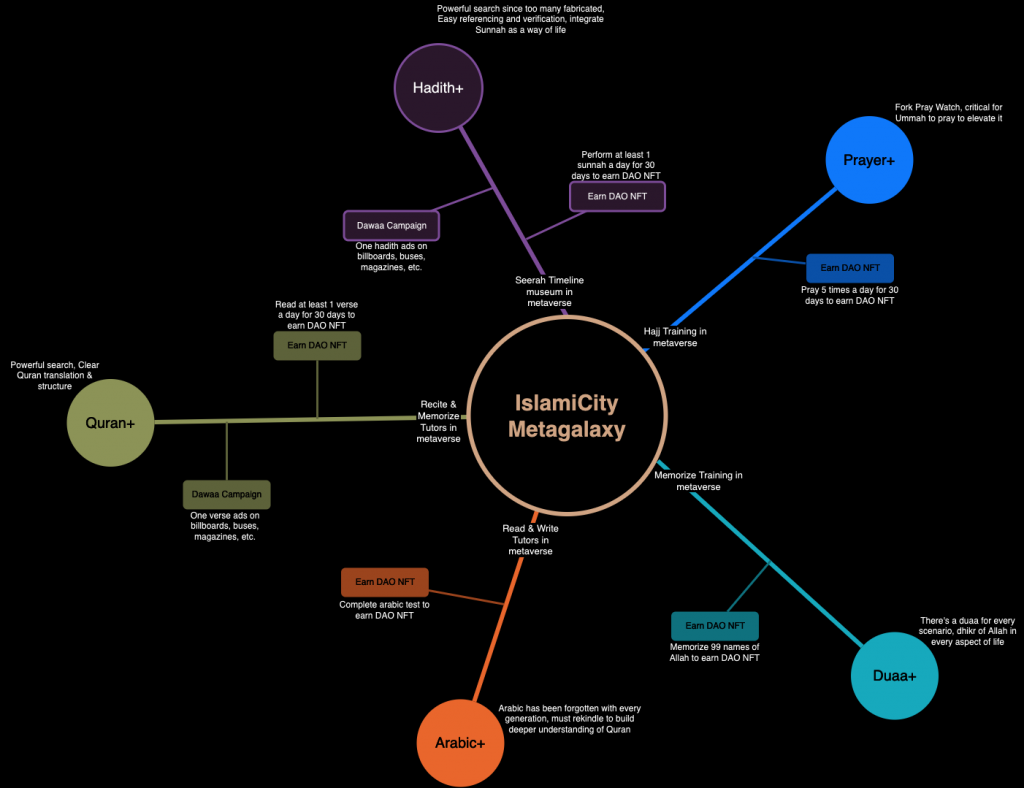﷽
UMMAH NETWORK: AN ISLAMIC & AUTONOMOUS SOCIETY
Abstract. The Ummah Network presents a revolutionary approach to unify the global Muslim community by leveraging decentralized technology. This initiative aims to create a secure, interconnected platform that transcends traditional geographic and political boundaries. At its heart lies the development of a decentralized protocol, which not only acts as a digital identity and financial hub but also integrates mosques as thriving, self-sustaining nodes. As long as the ecosystem’s needs are met from within the system through various mosques, a sovereign economy emerges. Establishing an independent economy powered by its own currency promotes financial self-sufficiency and resilience. A key milestone thereafter is attaining distributed property and building institutions that serve the network’s members, elevating the Ummah to a global, autonomous society. This endeavor reimagines Islamic communities in the digital age, fostering unity and empowering the Muslim diaspora through a blend of traditional values and innovative technology, setting a new paradigm for Ummah progress and collaboration.
Introduction
Essential to this vision is a decentralized protocol, a cornerstone in digitally uniting the Ummah. The initiative then shifts focus to transforming mosques into self-sustainable, central nodes within the network, anchoring them not only as spiritual centers but also as hubs of the Ummah’s life and functions. Complementing this is the cultivation of an independent, resilient economy with its own novel, asset-backed currency, designed to ensure the Ummah’s financial self-sufficiency, prosperity, and welfare. Finally, the quest for distributed property and institutions stands as a testament to the network’s autonomy. This pursuit symbolizes a crucial step towards self-sufficiency, representing the interests and values of the Ummah.
At its core, the Ummah Network is a movement towards fostering profound unity, establishing a new paradigm of community-led governance that places Islamic values, self-determination, and the best interests of the Ummah. To achieve this ambitious goal, what follows is a phased approach.
Phase 1: Digital Infrastructure
The first phase is centered on developing a comprehensive protocol that serves as a digital hub for the Ummah. This protocol is pivotal as it establishes the decentralized foundation necessary for security, utility, and resilience. It’s designed to be multifaceted, addressing various needs and fostering a sense of digital citizenship within the network.
- Identity: Incorporating a blockchain-based identity, this aspect of the protocol will serve dual purposes. Firstly, wallets on top of the protocol will act as a comprehensive gateway to the network, offering a consolidated view of the user’s engagement and assets within the ecosystem, as well as acting as a digital identity system using its NFT storage capability, which holds their citizenship, badges, memberships, deeds, and proofs, thereby enriching the user experience with layers of value and utility. Secondly, it functions as a virtual bank account, facilitating seamless financial investments, trade, and charity across the network. Note that since NFTs and assets are on-chain, a third-party or custom-built wallet can be used, but the integrated wallet described here is a unique, unified display making it an essential tool for navigating and benefiting from the full spectrum of the network’s offerings.
- Communication: The protocol includes a secure messaging feature, powered by blockchain technology, ensuring robust resistance, privacy, and interoperability across different platforms. This messaging system enables users to create groups for community interaction and announcement boards for disseminating various types of information, including media, newsletters, and event details, thus playing a crucial role in community building and information sharing.
- Knowledge: A key component of the initiative is an extensive knowledge library, crucial for educating and spiritually uplifting the Muslim mind. It is in the footsteps of Prophet Muhammad (ﷺ) built up the first generation of the Ummah and must be a strategy in rebuilding it. This digital, on-chain library hosts apps on top that surfaces the Quran in different languages and Hadith collection, all equipped with interactive features like shared highlights and discussion forums, as well as AI-powered features that provide personalized Islamic learning experiences, adapting to the individual’s knowledge level and learning style. Additional resources include a consumable prayer specification, tools for Duaa and Arabic learning aimed at enhancing Quranic understanding, and a comprehensive collection of Islamic scholarly works, Tafsirs, and writings. The library also delves deep into Islamic history shedding light on often neglected or misrepresented narratives, utilizing VR technology to create immersive tours of important Islamic heritage sites, thereby helping the community understand its past and chart a clear course for the future. NFTs will be minted of completed studies to serve as academic certifications that will be used for voting weights and leadership roles.
In essence, phase 1 lays the foundational digital infrastructure, aiming not just to provide tools but to create a gateway for a unified, educated, and financially empowered Muslim community. It marks the beginning of building a decentralized, resilient, and self-sufficient Ummah, rooted in the principles of community and knowledge inherent in Islamic teachings.
Phase 2: Core Group
The second phase focuses on the vital task of assembling a dedicated core group of members to drive the Ummah Network forward. This phase involves bringing together individuals who share a common vision for the network, are committed to its long-term success, and are willing to invest their assets, skills, and expertise. A pivotal part of this phase is an NFT campaign, where each token symbolizes citizenship within the network, fostering a sense of belonging and commitment.
Skilled Guilds
The core group members will play a crucial role in forming specialized guilds based on their field of expertise. These guilds, integral to the network’s functionality, will be compensated for their contributions through tokenomics and a decentralized exchange, ensuring a self-sustaining economy. Recognizing that volunteerism alone is not sustainable, this model ensures that value flows within the network, supporting its members and initiatives. The guilds include:
- Engineering Guild: Responsible for building and maintaining the technical infrastructure of the network. This guild ensures the network’s security, availability, and transparency.
- Creative Guild: Tasked with producing content, art, poetry, podcasts, documentaries, movies, books, kids content, and visuals for campaigns, media, advocacy, and outreach. This guild plays a key role in shaping the network’s reach and messaging.
- Spiritual Guild: Comprised of recognized scholars and Islamic teachers, this guild offers guidance and spiritual inspiration to the network, ensuring alignment with Islamic principles.
- Finance Guild: Designs and manages the network’s economy to be self-sufficient and Shariah-compliant. This includes overseeing asset backing, incentive mechanisms, trade, dividend and appreciation models, loans, Zakat, and startup incubators.
- Legal Guild: Focuses on ensuring the network’s compliance with international laws and provides legal services to its members. This guild is crucial for navigating the legal landscape and protecting the network.
- Health Guild: Dedicated to providing physical and mental health services through telehealth, programs, and other means, addressing the well-being of network members.
Town Halls and Webinars
Regular virtual town hall meetings and webinars will be a key feature of this phase. These events will address crucial issues within the Muslim community and the network, offering a platform for discussion, decision-making, and direction setting. These gatherings will be essential for communication between the network and guilds, facilitating a cohesive and coordinated approach to achieving the network’s goals.
In summary, phase 2 lays the groundwork for a robust, engaged, and skilled community. By forming specialized guilds and fostering regular communication and collaboration, the Ummah Network is set to grow into a well-organized, dynamic, and effective entity, driven by a shared vision and collective effort.
Phase 3: Community Building
This phase concentrates on expanding community engagement and harnessing the existing initiatives of the Ummah. This stage is about forging partnerships and aligning various entities with a unified vision, focusing on mosques, organizations, and influencers.
- Mosques: In this phase, mosques worldwide are envisioned as key physical spaces within the network, akin to dynamic nodes or embassies of the Ummah. The approach involves assisting mosques in becoming self-sustainable and enhancing their role as comprehensive community centers. This encompasses utilizing mosques for events, meetings, and collaborative workspaces, supporting them through crowdfunding for expenses, and implementing renewable energy solutions, smart technologies, and food gardens. Such initiatives aim to make mosques self-sufficient and pivotal in the network’s philosophy, functioning also as centers for education, diplomacy, social welfare, and global coordination.
- Organizations: The network plans to reach out to a variety of Muslim organizations engaged in charity, outreach, advocacy, legal, and other services. The objective is to integrate these organizations into the network, expanding its reach and capabilities. Collaborative efforts in social and environmental welfare are expected to strengthen community bonds.
- Influencers: Recognizing the power of influential individuals with substantial followings, the network seeks to engage with influencers who align with its vision. Their participation is anticipated to be instrumental in expanding the network’s reach and attracting a diverse audience.
Conferences and Seminars
Organizing a series of virtual and physical Islamic conferences and seminars is a significant part of this phase. These events will address critical Islamic and global issues, leveraging the network’s capabilities to facilitate comprehensive participation. They serve as platforms for intellectual exchange, discussion, and learning, furthering the network’s role in fostering a well-informed and connected Muslim community.
In summary, phase 3 is a strategic effort to broaden the network’s influence and operational capacity. By integrating mosques as active components, collaborating with various Muslim organizations, and leveraging the reach of influencers, the network aims to cultivate a more unified, empowered, and resilient Muslim Ummah. The hosting of conferences and seminars underscores the network’s commitment to being a hub for dialogue, intellectual enrichment, and unity.
Phase 4: Properties
A comprehensive blueprint for building the next generation muslim society can be examined from the genesis and rise of the Islamic civilization. Prophet Muhammad (ﷺ) made each mosque a beacon in society, and was fully realized later in the leadership of Ummar ibn Khattab ( رضي الله عنه). There are some key ingredients that can be examined from this era:
- Cities were build around mosques instead of being byproducts of cities
- Self-governance was established through new administrative institutions
- A thriving economy was facilitated through a shared treasury
The architecture of cities built under Ummar ibn Khattab’s rule was iconic and profoundly effective. The strategy was to create a mosque at the center of the city, then build homes, markets, schools, and agriculture around it. This template was used throughout his rule and was essential to its scaling. This is evident from the renderings below, which would serve as a foundation and inspiration for properties built within the Ummah network society.
This phase distributes the network society physically while retaining unity digitally. It marks a critical transition from the digital realm to establishing a physical presence and thereby blending physical and digital community spaces.
Phase 5: Institutions
This phase lays the foundations of a minimal viable autonomous society. This phase is about legitimizing the network and building generational capacity through the development of seed institutions, subsidiary funds, organizations, and an internal economy. The aim is to equip the network with the necessary structures for effective self-governance and member service.
- Governance: The governance structure of the network will pivot around a Decentralized Autonomous Organization (DAO). This DAO will incorporate Islamic principles, such as a Shurah council, which will be distributed through the NFT membership. The governance model will give more weight to the Spiritual Guild and individuals holding NFT certifications from the library, ensuring decisions are aligned with Islamic values and knowledge. The DAO will be seamlessly integrated into the protocol, allowing members to easily access, view, add, and vote on proposals, as well as track governance history.
- Economy: The launch of a network-specific cryptocurrency is a crucial step towards achieving financial independence and self-determination for the Ummah. Spearheaded by the Finance Guild, the development of tokenomics will focus on sustainability and prosperity through trade and a circular economy. The protocol will feature tools built on top for auditing and monitoring key performance indicators, maintaining transparency and providing insights into the network’s economic health.
- Welfare: Addressing fundamental needs such as housing and healthcare is a priority. The network plans to invest in residential real estate near mosques, which will serve both as housing for citizens and a source of profit-sharing for network growth. Mosques are envisioned as central to community life, literally and metaphorically. The Health Guild will lead the healthcare initiative, aiming to provide coverage for all citizens. Initially, this may involve partnerships with Shariah-compliant insurance providers, progressing towards a self-sustained healthcare system as the network grows. Ownership of house deeds and healthcare coverage will be tokenized and managed within the super app, represented as NFTs.
In this phase, the network takes substantial steps towards becoming a self-sufficient entity with its own governance, economy, and welfare systems. By blending traditional Islamic governance models with modern decentralized technologies, the network sets the stage for a unique, effective, and holistic approach to state-building. The integration of these components into the protocol further ensures accessibility and engagement for all network members.
Conclusion
The Ummah Network marks a paradigm shift in the trajectory of the global Muslim community, aligning resources, skills, and aspirations that have long sought a unifying platform. By channeling the resilient power of decentralized technology, this initiative embarks on a mission to consolidate, invigorate, and uplift the Ummah, addressing the fragmentation that has characterized the last century and unlocking its vast potential. The journey starts with the development of a decentralized protocol, a foundational step that paves the way for mosques to evolve into a mesh of self-sufficient, multifaceted nodes for global Muslim community, bridging the digital and physical realms.
The establishment of a robust, globally self-sustaining economy within the network emerges as a key milestone, assuring financial independence and enduring prosperity for the Ummah. Moreover, the quest for distributed properties and unifying institutions are strategic moves towards autonomy, empowering the Ummah to represent its collective interests and values.
The Ummah Network is more than a technological venture; it is a renaissance of the Ummah’s unity and welfare. As this transformative journey unfolds, the network is poised to be a beacon of hope, progress, and collaboration for Muslims worldwide. It stands as a testament to the unifying power of decentralized technology, fostering a future where the Ummah thrives, driven by shared values and fortified by collective strength. This initiative is about crafting a legacy – a legacy that encapsulates unity, empowerment, and innovation, shaping the Ummah for generations to come.
References
- Comparative advantage, https://en.wikipedia.org/wiki/Comparative_advantage
- IslamiCity, the Global Muslim eCommunity, https://www.islamicity.org
- Mint the Entire Quran on the Blockchain, https://quranplus.app
- Quora, what were the main achievements of Umar ibn Khattab?, https://qr.ae/pvsqCf
- MetaKawn Huffaz Club, https://metakawn.com
- Hijabi Queens & Bearded Kings, https://hijabiqueens.io
- Muslim 3D, virtual reproduction of Makkah, https://muslim3d.io
- Muslim coins, a currency for the Ummah, https://muslimcoins-ico.com
- Islamic DAO, an Islamic Finance & Investment in crypto, http://islamicdao.com
- Marhaba, world’s first ethical halal DeFi ecosystem, https://mrhb.network
- Umar ibn Khattab’s administration, https://www.slideshare.net/UsmanShah7/hazrat-umar-bin-khattabsra-administration
- Developing Islamic City through Network-of-Mosque, https://www.researchgate.net/publication/283568876_Developing_Islamic_City_through_Network-of-Mosque
- Islamic Coin / HAQQ network: https://islamiccoin.net
- The Network State: https://thenetworkstate.com
- Afropolitan: https://afropolitan.io
- Takadao: https://takadao.io
Appendix
IslamiCity will be a one of the many metagalaxies of the metaverse. It will be geared towards Islamic education to muslims & non-muslims and will designate a physical mosque that is conductive to its goals. We are also looking to partner and support other initiatives to join and create a metagalaxy in the Ummah metaverse.
IslamiCity was the first website to make the entire Quran available in audio and text online in 1995 during the beginning years of the public internet [2]. As the new digital era of blockchains, IslamiCity has emerged as a leader and pioneer in the Ummah’s metaverse. It has led the efforts to create the whitepaper, tokenomics, DAO, associated NFTs and smart contracts, and will further create a metagalaxy which will then be used as a model. Below is part of a multi-phased roadmap for upgrading IslamiCity to web3 technologies and help create the metaverse ensuring Ummah maintains an important stake in the emerging digital landscapes.



